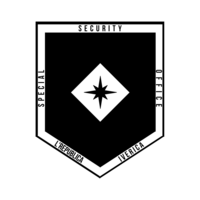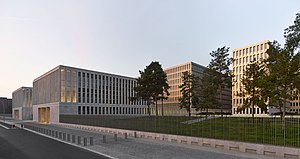Special Security Office
| Oficina dei Specialé Securidad | |
 Seal of the Special Security Office | |
 SSO headquarters, Intreimor | |
| Agency overview | |
|---|---|
| Formed | March 15, 1910 |
| Preceding agency |
|
| Type | Independent Agency of the Republic of Iverica, component of the Federated Iberic Intelligence Community |
| Jurisdiction | Unbound; domestic operations require special authorisation |
| Headquarters | SSO General Headquarters Intreimor, Nou Tacalonia, IVE |
| Motto | "Know thy neighbour" (anon.) |
| Employees | 15,020 (estimate) |
| Annual budget | $6.5 billion (as of 2020[update]) |
| Agency executives |
|
The Oficina dei Specialé Securidad (OSS), known in Anglish as the Special Security Office (SSO), is a foreign intelligence service of the Republic of Iverica, tasked with covertly gathering, processing, and analysing national security information from around the wurld, primarily through the use of human intelligence. As one of the principal members of the Iverican Security and Intelligence Offices, the SSO reports to the Foreign Secretary and is primarily focused on providing intelligence for the Executive Ministry and Corregidor High Command.
Unlike the Home Security Office (HSO), which is a domestic security service, the SSO has no law enforcement function and is mainly focused on overseas intelligence gathering, with only limited domestic intelligence collection. Though it is not the only agency of the Iverican state specializing in HUMINT, the SSO serves as the national manager for coordination of HUMINT activities across the Iberic intelligence community. Moreover, the SSO is the only agency authorized by law to carry out and oversee covert action at the behest of the Executive Ministry Praesidium.
The SSO has expanded in size, scope, and budgetary allocation, after the Vigilo Doctrine of 1989. Vigilo was a security plan which emphasised proactive and aggressive deployment of intelligence assets around the Iberosphere and western Argis. It was enacted in response to the rise of Vasqqan Narvic-Nationalist terrorist attacks in population centres close to the Vasqqan border, though the noted rise in Slavosphere intelligence activities was also a motivator. Acting in concert with the military technology modernisation plan "RAS 2020", the SSO also expanded its cyberwarfare capabilities, reportedly by sharing the use of the Iverican Air Force (Fuersas L'Aire), Cyberwarfare Group's botnet, GYGES for cyber intelligence gathering. Today, the SSO deploys these indirect action measures alongside direct action measures. Notably, it has played a keyrole in the dismantling of The Circle terrorist group.
History
Originally formed the Bureau of Information (active: 1870-1910), the SSO was legitimised by Parliamentary (Cámra Nasional) act in 1910. The SSO, like the Bureau of Information was originally intended to be a corps of plainclothes operatives emplaced within Iverican foreign trade holdings (such as in colonies, foreign ports, or in neighbouring powers) to provide discrete security and critical information. In the early 20th century, the Iverican government realised the mounting need to maintain a more proactive intelligence force. Prompted by the expansion of Iverican martime trade into more Alharun and Aurelian nations, the Executive Ministry reddefined the Bureau as the SSO. In that decade, the SSO's responsibility expanded to the active collection of foreign intelligence and the infiltration of organisations acting against Iverican interests and security. During the First Argic War, the SSO experienced dramatic growth and began actively developing communication and encryption technologies, beginning a doctrine seeking technological superiority that the office still follows in the 21st century. Today, SSO is still only subject to the upper echelons of government oversight by the Executive Ministry Praesidium, the Parliamentary National Security Committee, and the Supreme Court Executive Censorate.
Purpose
When the SSO was created, its purpose was to covertly protect Iverican foreign holdings. Today its primary purpose is to collect, analyze, evaluate, and disseminate foreign intelligence normally by means of covert operation.
According to its fiscal 2019 mission statement, the SSO has five priorities:
- Counterintelligence- especially to protect other Iverican operations abroad.
- Counterterrorism- taking proactive steps to infiltrate and undermine terrorist organisations.
- Nonproliferation- of nuclear and other weapons of mass destruction.
- Monitoring- of foreign civil affairs and important overseas events.
- Cyber Intelligence- maintaining the integrity of government channels and investigating potential threats.
Function
The procedures of SSO operations are given a wide allowance as stated in several National Security Statutes which grant them operational freedoms with minimal oversight. Actions by the SSO have occasionally been lambasted with scepticism and suspicious assertions, in part due to the office's disregard for traditional ethics in the face of their overall intelligence-providing goal. As of 2018, no legal case against SSO personnel that implicate the greater leadership or administration has passed courts, likely due to the "Disavowment Clause" in the employ of all agents—surrendering their right to claim affiliation with the office under capture or malicious influence during a classified operation. Cases filed in previous years for human rights abuses and other foul play have been dismissed by the Judiciary for lacking or circumstantial evidence.
Operating primarily through human intelligence gathering with supplements from internet and electronic surveillance, the SSO uses strategies and tactics common in fifth-generation warfare to achieve covert goals with great efficiency and flexibility. Usage of loose paper or digital trails from the Cyber Action Division (CAD) are filtered and analysed by DAFT, providing accurate intelligence for field agents in various theatres. Actions by field agents are not always direct, violent, nor lethal. Agents are skilled in a wide range of methods including but not limited to, infiltration, dissembling, social deception, and seduction. They may utilise online data like social media activity or information dissemination to leverage goals, manipulate digital mediums, or influence traditional media of fourth and fifth estates (journalism and independent reporting) to make small influences on an individual or demographic's worldview for a long-term effect on their goals.
Organization
The SSO has five major Divisions:
- Foreign Activities Division (FAD)
- Division for Analytics of Foreign Threats (DAFT)
- Cyber Action Division (CAD)
- Special Interior Division (SID)
- Asset Management Division (ASMA)
